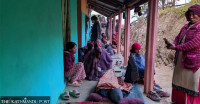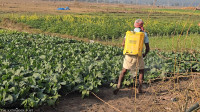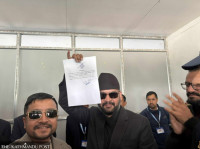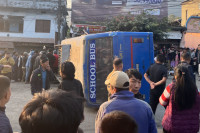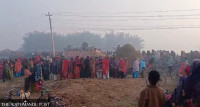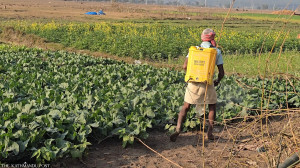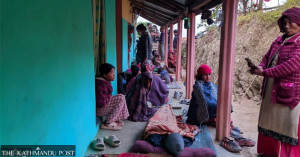Koshi Province
Government neglect leaves villages without piped water
Bad roads extend travel time between Ilam headquarters and Mangsebung Rural Municipality to over six hours although the distance is just 80 km.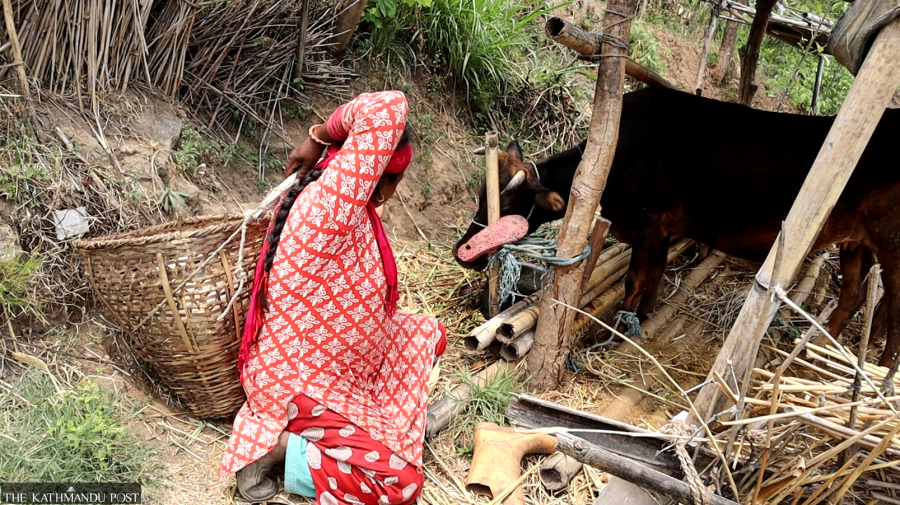
Laxmi Gautam
Sanuja Shankar, a 46-year-old woman from Ibhang in ward 2 of Mangsebung Rural Municipality, Ilam, walks for half an hour to fetch a bucketful of water from the nearest spring and nearly an hour to return home.
“Walking up and down the hills to fetch water is my daily routine, and I think I have spent half my age walking to spring and coming back,” Shankar said. “This is not only my problem but one of the whole village.”
Like Shankar, Ramila Sambahamphe from Ibhang also suffers from the same problem every day. Sambahamphe said that she has three cattle, and every day, she needs 12 buckets of water for the cattle and four buckets for household chores.
“When election season comes, common people like us who have been suffering from the shortage of water for ages have the opportunity to share our problem,” Sambahamphe said. “In the previous election, the leaders who visited our village assured us that they would install taps in every house, bring water, and distribute free pipes, but nobody showed up after winning the election.”
She added, “This time, no candidate has even come to ask for our votes, and if they do, I am fully prepared to confront them.”
A by-election has been scheduled in a Ilam constituency this weekend.
The residents of wards 1 and 2 of Mangsebung Rural Municipality in Ilam have been suffering from the drinking water shortage for ages. Even though Mangsebung Rural Municipality is only 80 kilometres away from the district headquarter, it takes more than six hours to reach wards 1 and 2 of the rural municipality by vehicle due to the bad condition of the roads.
Like Mangsebung, the folks of Deumai Municipality and Mai Municipality of the district also suffer from the problem of drinking water. The locals of these local units say they are frustrated now because the political leaders only raise this issue during the election, asking for votes, and disappear afterwards without solving their problems.
The locals of Mangsebung Rural Municipality, Deumai Municipality, and Mai Municipality also complain that they are forced to travel to Dharan or Damak due to a lack of reliable maternity services in the local units. The local units are surrounded by the Phewa and Phakphok streams, and during the rainy season, most of the villages and settlements are flooded, which disconnects them from other places.
Prem Kumari Rai from ward 4 of Mangsebung said that there is no motorable bridge over the Phakphok stream, due to which locals suffer a lot to reach health institutions in case of emergencies.
“During the monsoon of 2021, the only motorable bridge over the Phakphok was washed away,” Rai said. “During the last federal elections, lots of leaders visited the areas, asking for votes and committing to build a bridge, but nobody showed up after the election.”
The distance from Mangsebung to Domukha in Jhapa is only 55 kilometres, but due to difficult and risky routes, the locals have to travel 155 kilometres through the Mechi Highway to reach Jhapa. During the rainy season, locals are trapped in Mangsebung because they lose access to road networks.
“After winning elections in this area, the MPs and ministers become big personalities and do not care about the problems of the locals,” Rai said. “We are fed up with the lies of leaders who always say they will build good roads and bridges but do nothing.”
The local residents, who are struggling with several problems from drinking water to health and infrastructure, were planning to tell their problems to the candidates for the by-election, but sadly, nobody showed up in the rural, remote settlements, they say.
“Everybody was prepared to confront them, but again, we got disappointed,” said Dambar Thapa, another local from Ibhang. “Maybe the leaders were aware that we would ask them difficult questions regarding our problems.”




 10.12°C Kathmandu
10.12°C Kathmandu
